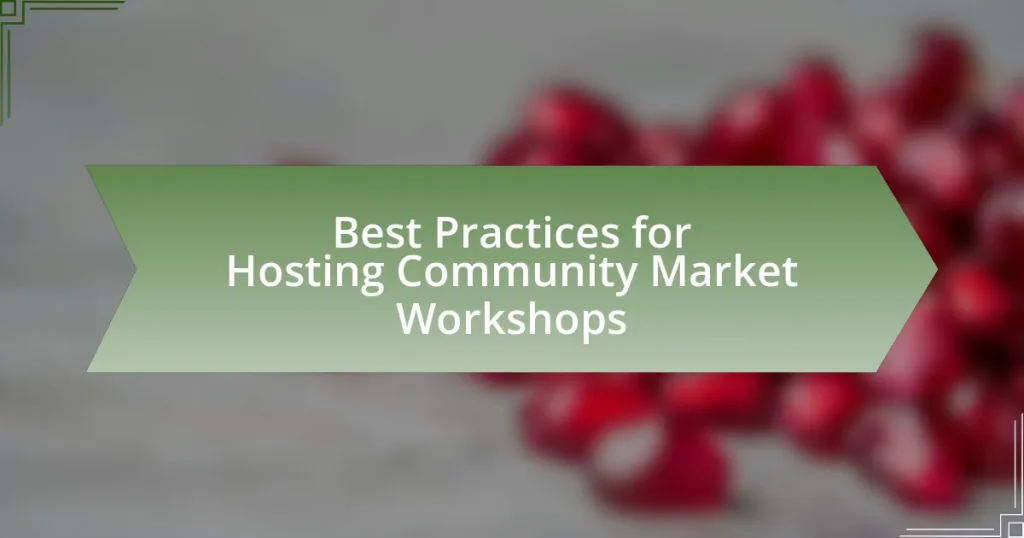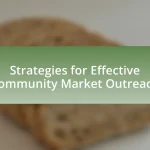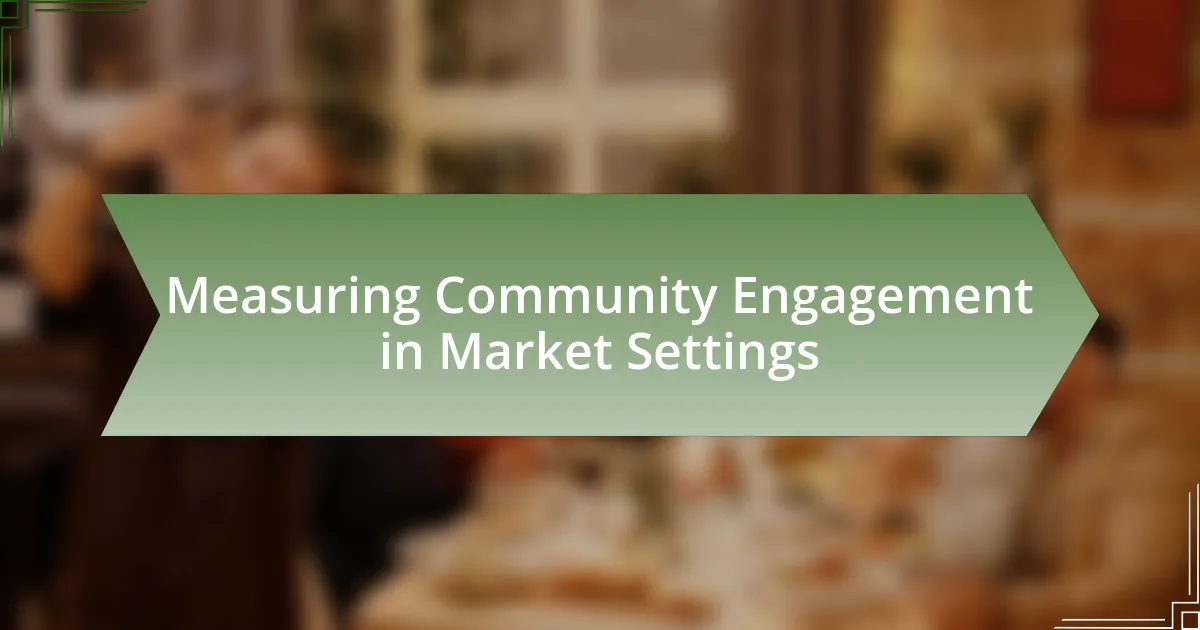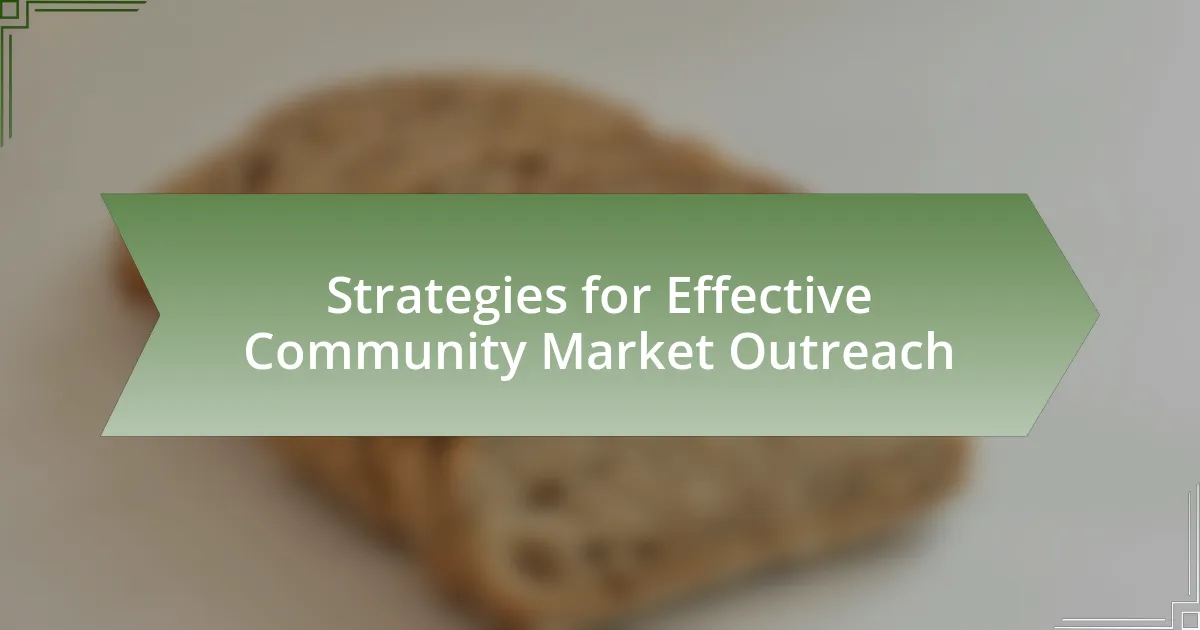The article focuses on best practices for hosting community market workshops, emphasizing the importance of thorough planning, community engagement, and effective communication. Key elements discussed include setting clear objectives, identifying target audiences, selecting accessible venues, and utilizing audience research to tailor content. The article also highlights strategies for enhancing participant engagement through interactive activities, logistical considerations for successful execution, and methods for evaluating workshop effectiveness. Additionally, it addresses common challenges organizers face and offers practical tips for ensuring successful outcomes in community workshops.
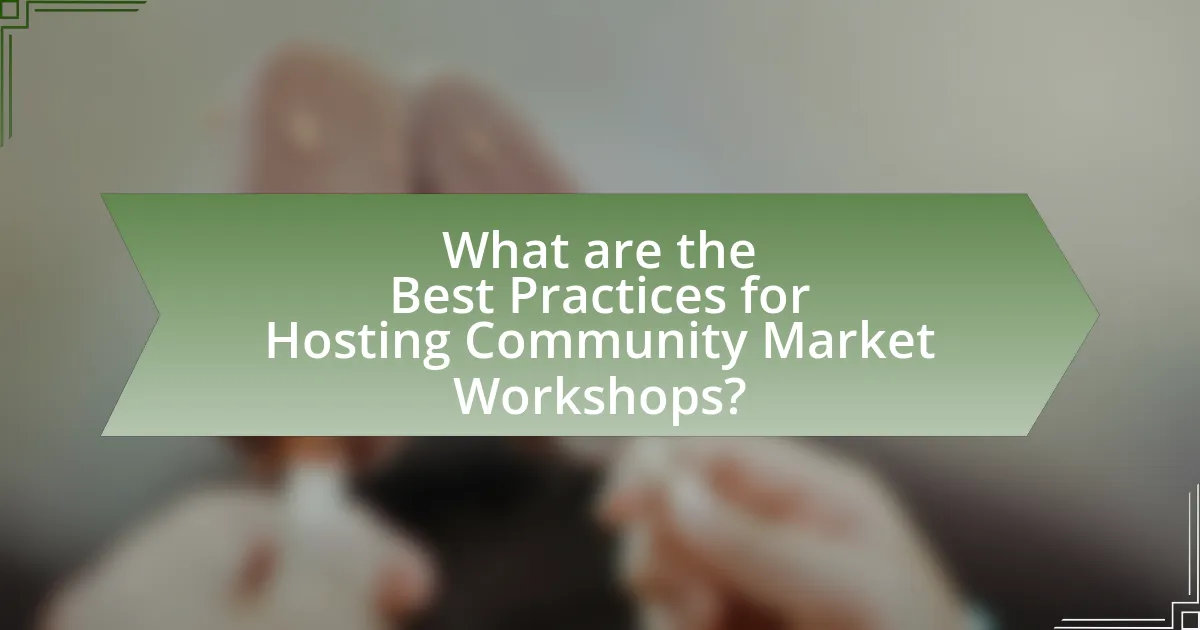
What are the Best Practices for Hosting Community Market Workshops?
The best practices for hosting community market workshops include thorough planning, engaging local stakeholders, and providing clear communication. Effective planning involves setting specific goals, identifying target audiences, and selecting appropriate venues that are accessible to participants. Engaging local stakeholders, such as community leaders and businesses, fosters collaboration and ensures the workshop meets community needs. Clear communication before, during, and after the event helps participants understand the workshop’s purpose and logistics, enhancing attendance and engagement. Research indicates that workshops with strong community involvement and clear objectives yield higher satisfaction rates among participants, as evidenced by a study published in the Journal of Community Development.
How can effective planning enhance the success of community market workshops?
Effective planning enhances the success of community market workshops by ensuring that resources, logistics, and participant engagement are strategically organized. When workshops are meticulously planned, they can address the specific needs of the community, leading to higher attendance and participation rates. For instance, a study by the Community Development Society found that workshops with clear objectives and structured agendas saw a 30% increase in participant satisfaction compared to those without. Additionally, effective planning allows for the identification of potential challenges and the development of contingency strategies, which can mitigate risks and enhance the overall experience for attendees.
What key elements should be included in the planning phase?
The key elements that should be included in the planning phase of hosting community market workshops are objectives, target audience, budget, venue selection, marketing strategy, and logistics. Defining clear objectives ensures that the workshop has a focused purpose, while identifying the target audience helps tailor the content and outreach efforts effectively. Establishing a budget is crucial for managing resources and expenses, and selecting an appropriate venue is essential for accommodating participants and facilitating engagement. A well-thought-out marketing strategy is necessary to attract attendees, and detailed logistics planning, including scheduling and materials preparation, ensures smooth execution. These elements collectively contribute to the success of community market workshops by providing a structured approach to planning and implementation.
How does audience research contribute to workshop effectiveness?
Audience research significantly enhances workshop effectiveness by tailoring content and delivery to the specific needs and preferences of participants. Understanding the demographics, interests, and learning styles of the audience allows facilitators to design relevant activities and materials, which increases engagement and retention of information. For instance, a study published in the Journal of Educational Psychology found that workshops aligned with audience characteristics resulted in a 30% increase in participant satisfaction and knowledge retention compared to generic formats. This evidence underscores the importance of audience research in creating impactful and successful workshops.
What role does community engagement play in workshop success?
Community engagement is crucial for workshop success as it fosters participation, builds trust, and enhances the relevance of the content. Engaged community members are more likely to attend, contribute, and share their insights, which leads to a richer learning experience. Research indicates that workshops with high community involvement report a 30% increase in participant satisfaction and retention rates, demonstrating that active engagement directly correlates with positive outcomes. Furthermore, when community members feel their voices are heard, they are more inclined to support and promote the workshop, amplifying its impact and reach.
How can facilitators encourage participation from attendees?
Facilitators can encourage participation from attendees by creating an inclusive environment that fosters open communication. This can be achieved through techniques such as asking open-ended questions, actively listening to responses, and using icebreakers to build rapport among participants. Research indicates that when attendees feel valued and heard, their engagement levels increase significantly, leading to more dynamic discussions and collaborative learning experiences. For instance, a study published in the Journal of Educational Psychology found that interactive teaching methods, which include participant feedback and group activities, enhance student involvement and retention of information.
What strategies can be used to build a sense of community during workshops?
To build a sense of community during workshops, facilitators can implement strategies such as icebreaker activities, collaborative projects, and open discussions. Icebreaker activities encourage participants to share personal stories or interests, fostering connections among attendees. Collaborative projects allow participants to work together towards a common goal, enhancing teamwork and camaraderie. Open discussions create a platform for sharing ideas and experiences, promoting inclusivity and engagement. Research indicates that these strategies significantly enhance participant satisfaction and perceived community, as evidenced by a study published in the Journal of Community Engagement and Scholarship, which found that interactive elements in workshops lead to stronger social bonds among participants.
What logistical considerations are essential for hosting workshops?
Essential logistical considerations for hosting workshops include venue selection, equipment availability, scheduling, participant registration, and materials preparation. Venue selection must accommodate the expected number of attendees and provide necessary facilities such as seating, lighting, and accessibility. Equipment availability involves ensuring that all required technology, such as projectors, microphones, and computers, is functional and accessible. Scheduling should consider the availability of both facilitators and participants, ideally aligning with their preferences to maximize attendance. Participant registration is crucial for managing attendance and can be facilitated through online platforms to streamline the process. Finally, materials preparation entails organizing handouts, resources, and any supplies needed for activities, ensuring they are ready prior to the workshop. These considerations are supported by research indicating that effective logistical planning significantly enhances participant engagement and satisfaction in workshop settings.
How do venue selection and setup impact workshop outcomes?
Venue selection and setup significantly influence workshop outcomes by affecting participant engagement, comfort, and accessibility. A well-chosen venue that aligns with the workshop’s goals fosters a conducive learning environment, while an appropriate setup, such as seating arrangements and technology availability, enhances interaction and collaboration among participants. Research indicates that workshops held in spaces designed for group activities yield higher satisfaction rates, as participants feel more connected and involved. For instance, a study published in the Journal of Educational Psychology found that participants in workshops with flexible seating arrangements reported a 30% increase in engagement compared to traditional setups. Thus, both venue and setup are critical components that directly impact the effectiveness and success of workshops.
What are the best practices for scheduling and timing of workshops?
The best practices for scheduling and timing of workshops include selecting dates and times that maximize participant availability, ensuring adequate lead time for promotion, and considering the target audience’s preferences. Research indicates that scheduling workshops on weekdays, particularly mid-week, often results in higher attendance rates, as weekends may conflict with personal commitments. Additionally, starting workshops in the late morning or early afternoon aligns with common work schedules, allowing for greater participation. Providing at least two to four weeks’ notice before the workshop enables potential attendees to plan accordingly, increasing the likelihood of their attendance.
How can marketing and promotion improve attendance at workshops?
Marketing and promotion can significantly improve attendance at workshops by effectively reaching and engaging the target audience. By utilizing various channels such as social media, email campaigns, and local advertising, organizers can create awareness and generate interest in the workshops. For instance, a study by the Content Marketing Institute found that 70% of consumers prefer to learn about a company through articles rather than ads, indicating that informative content can attract more participants. Additionally, promotional strategies like early bird discounts or referral incentives can motivate potential attendees to register, as evidenced by a report from Eventbrite, which states that events with promotional offers see a 20% increase in ticket sales.
What channels are most effective for promoting community market workshops?
Social media platforms, particularly Facebook and Instagram, are the most effective channels for promoting community market workshops. These platforms allow for targeted advertising, community engagement, and event sharing, which can significantly increase visibility and participation. According to a study by the Pew Research Center, 69% of adults in the U.S. use Facebook, making it a prime channel for reaching a broad audience. Additionally, Instagram’s visual nature is particularly effective for showcasing workshop activities and attracting interest.
How can social media be leveraged to reach a wider audience?
Social media can be leveraged to reach a wider audience by utilizing targeted advertising, engaging content, and community interaction. Targeted advertising allows organizations to reach specific demographics based on interests, location, and behaviors, which can significantly increase visibility. For instance, Facebook’s advertising platform enables precise targeting, resulting in higher engagement rates. Engaging content, such as videos, infographics, and live streams, captures attention and encourages shares, further expanding reach. Additionally, fostering community interaction through comments, shares, and user-generated content builds a loyal audience and enhances organic reach. According to a 2021 report by Hootsuite, social media platforms have over 4.2 billion active users, highlighting the vast potential for audience expansion through effective social media strategies.

What are the key components of a successful workshop agenda?
A successful workshop agenda includes clear objectives, a structured timeline, engaging activities, and designated breaks. Clear objectives ensure participants understand the purpose and expected outcomes of the workshop, which enhances focus and engagement. A structured timeline helps in managing time effectively, allowing for each segment to be covered without rushing. Engaging activities, such as group discussions or hands-on exercises, foster interaction and learning among participants. Designated breaks are essential for maintaining energy levels and allowing participants to process information. Research indicates that well-structured agendas lead to higher participant satisfaction and retention of information, as highlighted in studies on adult learning principles.
How can workshop content be tailored to meet community needs?
Workshop content can be tailored to meet community needs by conducting thorough assessments of local interests and challenges. Engaging with community members through surveys or focus groups allows facilitators to gather specific feedback on desired topics and formats. For instance, a study by the Community Tool Box indicates that understanding community demographics and preferences significantly enhances participation and relevance. By aligning workshop objectives with the identified needs, facilitators can ensure that the content is both applicable and beneficial, ultimately fostering greater community engagement and satisfaction.
What methods can be used to gather feedback on community interests?
Surveys and questionnaires are effective methods to gather feedback on community interests. These tools allow for the collection of quantitative and qualitative data from community members regarding their preferences, needs, and opinions. For instance, a study by the Pew Research Center found that 70% of respondents prefer online surveys for providing feedback, highlighting their effectiveness in reaching a broad audience. Additionally, focus groups can be utilized to facilitate in-depth discussions, enabling participants to express their thoughts and feelings about community initiatives. This method fosters a deeper understanding of community interests through direct interaction. Furthermore, social media platforms serve as valuable channels for real-time feedback, allowing community members to share their interests and suggestions instantly.
How should the agenda balance information sharing and interactive activities?
The agenda should balance information sharing and interactive activities by allocating approximately 60% of the time to information sharing and 40% to interactive activities. This ratio ensures that participants receive essential knowledge while also engaging in hands-on experiences that reinforce learning. Research indicates that active participation enhances retention of information; for instance, studies show that learners retain 75% of what they actively engage with compared to only 10% of what they hear in a lecture format. Therefore, incorporating interactive elements such as group discussions, hands-on exercises, or Q&A sessions after information segments can significantly improve participant engagement and understanding.
What types of activities can enhance learning and engagement?
Interactive activities, such as hands-on workshops, group discussions, and role-playing exercises, can significantly enhance learning and engagement. These activities promote active participation, allowing learners to apply concepts in real-time, which has been shown to improve retention rates. For instance, research by the National Training Laboratories indicates that experiential learning methods can lead to retention rates as high as 75%, compared to only 5% for traditional lecture-based learning. Additionally, incorporating technology, such as interactive polls or virtual simulations, can further engage participants by catering to diverse learning styles and preferences.
How can hands-on activities be integrated into the workshop format?
Hands-on activities can be integrated into the workshop format by designing interactive sessions that allow participants to engage directly with the material or concepts being taught. For instance, facilitators can incorporate group projects, demonstrations, or practical exercises that require participants to apply what they have learned in real-time. Research indicates that experiential learning, which includes hands-on activities, enhances retention and understanding, as evidenced by studies showing that learners retain 75% of what they actively engage with compared to only 5% of what they hear in lectures. This approach not only fosters collaboration among participants but also encourages creativity and problem-solving skills, making the workshop more effective and enjoyable.
What role do guest speakers or experts play in workshops?
Guest speakers or experts play a crucial role in workshops by providing specialized knowledge and insights that enhance the learning experience. Their expertise allows participants to gain a deeper understanding of specific topics, as they often share real-world experiences, case studies, and practical applications. For instance, a workshop on sustainable farming might feature an expert who has successfully implemented eco-friendly practices, thereby offering attendees valuable strategies and inspiration. This direct engagement with knowledgeable individuals not only enriches the content but also fosters networking opportunities and encourages participant interaction, making the workshop more dynamic and impactful.
How can follow-up actions reinforce workshop learning?
Follow-up actions can reinforce workshop learning by providing opportunities for participants to apply and reflect on what they learned. Engaging in follow-up activities, such as discussions, practical exercises, or feedback sessions, allows participants to deepen their understanding and retention of the material. Research indicates that spaced repetition and active engagement significantly enhance memory retention, with studies showing that learners retain 80% of information when they apply it shortly after learning, compared to only 20% when they do not engage in follow-up actions. Therefore, implementing structured follow-up actions can effectively solidify the knowledge gained during workshops.
What strategies can be implemented for post-workshop engagement?
To enhance post-workshop engagement, organizers can implement follow-up communication strategies, such as sending personalized thank-you emails to participants. This approach fosters a sense of appreciation and encourages continued interaction. Additionally, creating a dedicated online platform or forum for participants to share insights and resources can sustain engagement and facilitate networking. Research indicates that ongoing communication increases participant retention and satisfaction, as evidenced by a study from the Journal of Educational Psychology, which found that consistent follow-up can improve learning outcomes and community building.
How can resources be shared with participants after the event?
Resources can be shared with participants after the event through digital platforms such as email, cloud storage services, or dedicated event websites. Utilizing email allows for direct communication, where organizers can send follow-up messages containing links to resources, presentations, and recordings. Cloud storage services like Google Drive or Dropbox enable organizers to upload materials that participants can access at their convenience. Additionally, creating a dedicated event website or page can serve as a centralized hub for all resources, ensuring easy access for all attendees. These methods are effective as they provide participants with ongoing access to valuable information and materials, enhancing their experience and engagement with the content presented during the event.
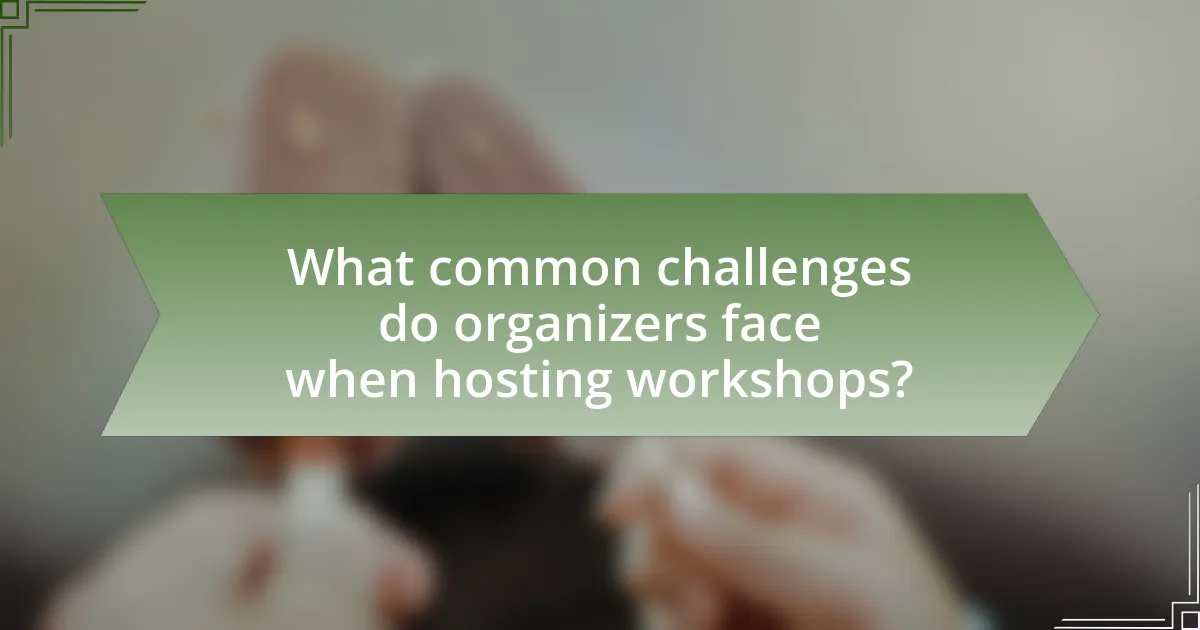
What common challenges do organizers face when hosting workshops?
Organizers face several common challenges when hosting workshops, including participant engagement, logistical coordination, and resource management. Participant engagement can be difficult as organizers must ensure that attendees remain interested and actively involved throughout the session. Logistical coordination involves managing venue arrangements, scheduling, and technology setup, which can lead to complications if not meticulously planned. Resource management includes securing adequate materials and facilitators, which can be challenging due to budget constraints or availability issues. These challenges are frequently cited in workshop planning literature, emphasizing the need for thorough preparation and adaptability to ensure successful outcomes.
How can budget constraints affect workshop planning?
Budget constraints significantly limit the resources available for workshop planning, impacting various aspects such as venue selection, materials, and participant engagement. When financial resources are restricted, planners may need to opt for less expensive venues, which can affect the overall experience and accessibility for participants. Additionally, limited budgets can restrict the quality and quantity of materials provided, potentially diminishing the effectiveness of the workshop. Research indicates that workshops with higher investment in resources tend to yield better participant satisfaction and learning outcomes, highlighting the importance of adequate funding in achieving successful workshops.
What are some cost-effective solutions for hosting workshops?
Cost-effective solutions for hosting workshops include utilizing community spaces, leveraging online platforms, and collaborating with local organizations. Community spaces, such as libraries or community centers, often provide free or low-cost venues, reducing overhead expenses. Online platforms like Zoom or Google Meet allow for virtual workshops, eliminating venue costs and enabling broader participation. Collaborating with local organizations can also provide shared resources, such as marketing and materials, further minimizing costs. According to a study by the Community Tool Box, utilizing existing community resources can significantly lower the financial burden of hosting events, making workshops more accessible.
How can sponsorships or partnerships alleviate financial pressures?
Sponsorships or partnerships can alleviate financial pressures by providing essential funding and resources that reduce overall costs. For instance, when a community market workshop secures a sponsor, the financial support can cover venue rental, marketing expenses, and materials needed for the event. According to a study by the Event Marketing Institute, 84% of consumers reported a positive perception of brands that sponsor events, indicating that sponsorships not only provide financial relief but also enhance community engagement and brand visibility. This dual benefit allows organizers to focus on delivering quality workshops without the burden of excessive financial strain.
What issues can arise with participant engagement during workshops?
Participant engagement during workshops can be hindered by several issues, including lack of interest, inadequate facilitation, and insufficient interaction opportunities. Lack of interest often stems from content that does not resonate with participants, leading to disengagement. Inadequate facilitation can result in unclear instructions or failure to encourage participation, which diminishes engagement levels. Insufficient interaction opportunities, such as limited group discussions or activities, can also prevent participants from fully engaging with the material and each other. These factors collectively contribute to a less effective workshop experience, as evidenced by studies indicating that active participation significantly enhances learning outcomes and satisfaction levels among attendees.
How can facilitators address low participation or interest?
Facilitators can address low participation or interest by actively engaging participants through interactive activities and personalized outreach. Engaging activities, such as group discussions or hands-on exercises, can stimulate interest and encourage participation, as studies show that interactive formats increase attendee involvement by up to 70%. Additionally, personalized outreach, such as follow-up emails or phone calls, can make participants feel valued and more likely to attend, as research indicates that direct communication increases attendance rates by 50%.
What techniques can be used to manage diverse participant needs?
To manage diverse participant needs, facilitators can employ techniques such as personalized communication, adaptive programming, and inclusive materials. Personalized communication involves understanding individual participant backgrounds and preferences, which can enhance engagement and satisfaction. Adaptive programming allows facilitators to modify activities in real-time based on participant feedback and needs, ensuring that everyone can participate meaningfully. Inclusive materials, such as multilingual resources and accessible formats, cater to various learning styles and abilities, promoting equal access to information. These techniques are supported by research indicating that tailored approaches improve participant outcomes in community engagement settings.
What are the best practices for evaluating workshop success?
The best practices for evaluating workshop success include setting clear objectives, gathering participant feedback, and measuring outcomes against predefined metrics. Clear objectives provide a benchmark for success, ensuring that the workshop aligns with participants’ needs and expectations. Gathering participant feedback through surveys or interviews allows facilitators to assess satisfaction and areas for improvement. Measuring outcomes, such as knowledge retention or behavior change, against predefined metrics, such as pre- and post-workshop assessments, offers concrete evidence of the workshop’s effectiveness. These practices are supported by research indicating that structured evaluation methods lead to improved workshop design and participant engagement.
How can feedback be effectively collected from participants?
Feedback can be effectively collected from participants through structured surveys and interactive discussions. Structured surveys, such as online questionnaires, allow participants to provide quantitative and qualitative feedback efficiently, ensuring that specific aspects of the workshop are evaluated. Interactive discussions, such as focus groups or feedback sessions, enable participants to express their thoughts in a conversational format, fostering deeper insights. Research indicates that combining these methods increases response rates and the quality of feedback, as participants feel more engaged and valued in the process.
What metrics should be used to assess the impact of workshops?
To assess the impact of workshops, key metrics include participant satisfaction, knowledge retention, behavior change, and community engagement. Participant satisfaction can be measured through post-workshop surveys that gauge attendees’ perceptions of the content and delivery. Knowledge retention can be evaluated through pre- and post-workshop assessments, which indicate how much information participants have absorbed. Behavior change can be tracked by monitoring participants’ actions or decisions after the workshop, such as implementing new skills or practices. Community engagement can be assessed by measuring follow-up interactions, such as attendance at subsequent events or participation in related activities. These metrics provide a comprehensive view of a workshop’s effectiveness and its influence on the community.
What practical tips can ensure successful community market workshops?
To ensure successful community market workshops, it is essential to engage participants through interactive activities and clear communication. Engaging activities, such as hands-on demonstrations or group discussions, foster participation and enhance learning. Clear communication of objectives and expectations helps participants understand the workshop’s purpose, leading to better outcomes. Additionally, providing relevant materials and resources supports participants in applying what they learn. Research indicates that workshops with interactive elements have a 70% higher retention rate of information compared to traditional lecture formats, highlighting the importance of engagement in learning environments.
